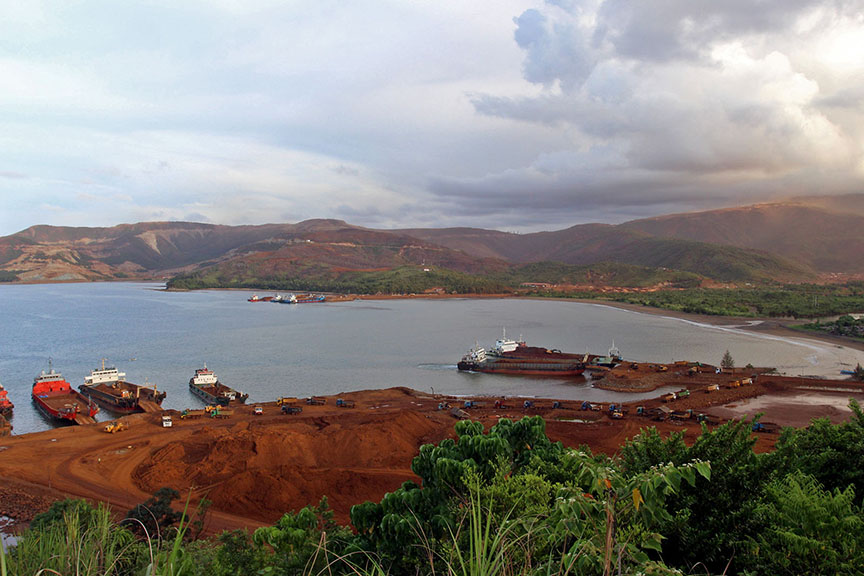Ban on export of raw minerals gets Senate nod

GENERAL SANTOS CITY (MindaNews / 07 February) – The Senate has approved a measure banning the export of raw minerals, similar to what Indonesia had put in place five years ago.
Senators approved on third and final reading Senate Bill (SB) 2826, authored by Senator Joseph Victor “JV” Ejercito, on Monday, February 3.
In an earlier BusinessWorld report, Ejercito said the ban on the export of mineral ores would lead to the construction of more mineral processing plants in the country.
“The rationale is for the mining firms to establish their processing plants because we want the finished product instead of just putting out raw materials for export,” he said in mixed English and Filipino.
“And if they process these (minerals) here, that will result in more employment and additional revenue. We patterned this after the Indonesian mining sector.”
SB 2826 primarily seeks to raise the government’s share in mining profits by imposing a five-tier margin-based royalty and windfall profit system for the mining industry. The House of Representatives passed a similar measure in September.
In a joint statement, the Chamber of Mines of the Philippines and the Philippine Nickel Industry Association expressed support for the fiscal provisions of SB 2826. President Ferdinand Marcos Jr. had certified the enactment of a rationalized mining fiscal regime as a priority legislative measure.
However, the miners strongly rejected the proposed export ban on unprocessed minerals, saying it will lead “to mine closures and consequently, to unemployment for hundreds of thousands of Filipino workers who rely on mining, directly or indirectly, for their livelihood.”
Senate President Francis “Chiz” Escudero said the ban on exports of minerals in their raw form would pave the way “for the development of local industries, production of higher-value exports, and the creation of more jobs for Filipinos.”
Section 9 of SB 2826 states: “Five years after the effectivity of the act, the export of locally extracted minerals in their raw form shall be prohibited.”
Under the proposal, the Philippines will ban the export of locally-extracted raw minerals—similar to what Indonesia put in place in 2020 when it stopped the exportation of nickel ore and bauxite in 2022.
“What we are looking at is to shift our policy from merely exporting raw minerals that will be utilized by other countries to produce higher value products, to developing our own processing capabilities. This will result in added value for our minerals-related exports, provide a much-needed boost to our economy and generate employment for our people,” Escudero said in a statement.
He explained that the five-year period in the measure is meant to provide the mining operators time to establish processing plants and downstream industries.
Demand for critical minerals such as nickel and copper has increased over the past decades as a result of the development of green initiatives such as the production of electric vehicles (EVs).
“Nickel and copper are key components in the production of lithium batteries of EVs and if we can harness the potential of these minerals here in the country, we can secure our place in the global supply chain, particularly in the production of EV batteries and maybe someday, our very own EV,” Escudero said.
The prohibition on exports of critical minerals is not unique to Indonesia and is in fact a global trend, albeit in varying degrees, he noted.
Escudero cited the Organization for Economic Cooperation and Development’s data, which showed that 53 countries have instituted export prohibitions on critical minerals between 2009 and 2020.
Other notable countries that have imposed prohibitions are Namibia, for unprocessed lithium and other critical minerals, and Zimbabwe for chromium.
Escudero said the motivation for states to adopt this policy “is understandable and the economic benefits are quantifiable.”
In the case of Indonesia, data cited by the Indonesian Chamber of Commerce and Industry shows the export value of the country’s nickel exports at US$20.9 billion in 2021 from a mere US$1.1 billion in 2014 before the prohibition on exports of nickel ore was imposed.
Once the law is enacted, Escudero said it would be key for the government to do its part in helping the industry players in putting up their respective mineral processing plants within the transition period.
The Philippines is one of the world’s biggest producers of nickel ore with a production of 35.14 million metric tons in 2023, Escudero said.
The country also hosts the biggest copper and gold minefield in Southeast Asia through the Tampakan project in South Cotabato.
The Tampakan project, pursued by Sagittarius Mines Inc., has yet to start commercial mining production. Media reports in Manila said the company is eyeing to begin mining operations in 2026. (Bong S. Sarmiento / MindaNews)



No comments:
Post a Comment